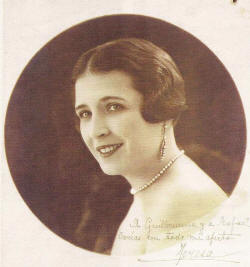

Partner Lydia Cabrera
Queer Places:
National Pantheon
Caracas, Municipio Bolivariano Libertador, Capital District, Venezuela
 Teresa de la Parra (October 5, 1889 – April 23, 1936) was a
Venezuelan novelist. Her novels "Ifigenia" (1924) and "Mama Blanca's
Souvenirs" (1929) deal with the mysteries of passing time and the decline of
her country's rural aristocracy, to which she belonged. They also comment,
with subtle irony, on the second-class status of women of her position. Many
critics today view Parra as an early feminist, while in her own time she was
accused by her (mostly male) detractors of "undermining the morals of women"
with her observations. Yet she offered no solutions to the problem of sexual
equality, and her creative outlook was more nostalgic than progressive.
Teresa de la Parra (October 5, 1889 – April 23, 1936) was a
Venezuelan novelist. Her novels "Ifigenia" (1924) and "Mama Blanca's
Souvenirs" (1929) deal with the mysteries of passing time and the decline of
her country's rural aristocracy, to which she belonged. They also comment,
with subtle irony, on the second-class status of women of her position. Many
critics today view Parra as an early feminist, while in her own time she was
accused by her (mostly male) detractors of "undermining the morals of women"
with her observations. Yet she offered no solutions to the problem of sexual
equality, and her creative outlook was more nostalgic than progressive.
She was born Ana Teresa Parra Sanojo in Paris, the daughter of Rafael Parra Hernáiz, Venezuelan Ambassador in Berlin, and Isabel Sanojo de Parra.
As a member of a wealthy family, Ana Teresa spent part of her childhood at her father's hacienda Tazón. After the death of her father, Ana Teresa and her sisters were taken by their mother to study at the Sacred Heart School, in Godella, Spain. Under fervent religious precepts, they received a solid education, suitable for upper-class young ladies. Ana Teresa returned to Caracas at the age of 19.
After she settled in Paris, de la Parra travelled and had an intense social life. She began to research a biography of Simón Bolívar, perhaps inspired by the centenary of his death. However, her idea was interrupted when she was diagnosed with tuberculosis. Teresa de la Parra wandered in several European sanatoriums, mainly in Switzerland and Spain, but did not find a cure. It was then that she met Cuban poet and anthropologist Lydia Cabrera who would play an important role in de la Parra's life during her last years. She reflected about her philosophical and literary ideas, and studied her own work and life evolution through the years. The longest and most beautiful letters ever written to her family and friends, and her intimate diaries, come from this time and must be considered as part of her literature.
Teresa de la Parra died in Madrid. Her remains were exhumed and brought to Caracas in 1947. In 1989, the 100th anniversary of her birth, she was reburied with honors at the National Pantheon in Caracas.
My published books: